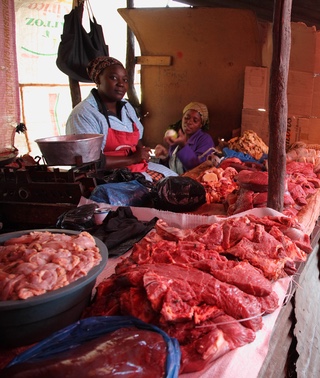
Podcast: Play in new window | Download (Duration: 24:52 — 20.3MB)
Subscribe: Google Podcasts | Spotify | Android | RSS | More
 Excluding animal products from your diet as a vegetarian or vegan is a choice some people have the luxury to make, and if they know what they’re doing, and take care, they can be perfectly healthy. But there are probably far more people who have no choice in the matter. They would eat meat if they could, but they simply can’t afford it. For those people, a little bit of animal source food – milk, meat, eggs – can make a great difference to their health and wellbeing. It can be easy to forget that, in the clamour for meatless Mondays and other efforts to respond to climate change. There’s also the fact that in many parts of the world, animals play a very useful role in transforming things people can’t or won’t eat, like grass, into good food.
Excluding animal products from your diet as a vegetarian or vegan is a choice some people have the luxury to make, and if they know what they’re doing, and take care, they can be perfectly healthy. But there are probably far more people who have no choice in the matter. They would eat meat if they could, but they simply can’t afford it. For those people, a little bit of animal source food – milk, meat, eggs – can make a great difference to their health and wellbeing. It can be easy to forget that, in the clamour for meatless Mondays and other efforts to respond to climate change. There’s also the fact that in many parts of the world, animals play a very useful role in transforming things people can’t or won’t eat, like grass, into good food.
One of the organisations promoting greater access to animal source foods is ILRI, the International Livestock Research Institute. They’re faced with some formidable challenges. One is to ensure that more animal foods doesn’t mean greater emissions of greenhouse gases. The other is to manage food safety as the demand for animal source foods grow. To find out more I talked to two people at ILRI: Shirley Tarawali, Assistant Director General, and Delia Grace, a veterinarian and epidemiologist.

Yes: a good wet market is better than a bad cold chain.
Mind if I take the opportunity to mention a podcast with two @ilri researchers who
In praise of meat, milk and eggs For poor people, a little animal source food goes a long way by Jeremy Cherfas from Eat This Podcast
Shirley Tarawali, Assistant Director-General, and Delia Grace, a veterinarian and epidemiologist.
Excluding animal products from your diet as a vegetarian or vegan is a choice some people have the luxury to make, and if they know what they’re doing, and take care, they can be perfectly healthy. But there are probably far more people who have no choice in the matter. They would eat meat if they could, but they simply can’t afford it. For those people, a little bit of animal source food – milk, meat, eggs – can make a great difference to their health and wellbeing. It can be easy to forget that, in the clamour for meatless Mondays and other efforts to respond to climate change. There’s also the fact that in many parts of the world, animals play a very useful role in transforming things people can’t or won’t eat, like grass, into good food. Eat This PodcastShare:TwitterFacebookLike this:Like Loading…Related
Where to push for greater food safety as food supply systems change is such a difficult question, as discussed in my podcast with Shirley Tarawali and Delia Grace @ILRI https://www.eatthispodcast.com/in-praise-of-meat-milk-and-eggs/